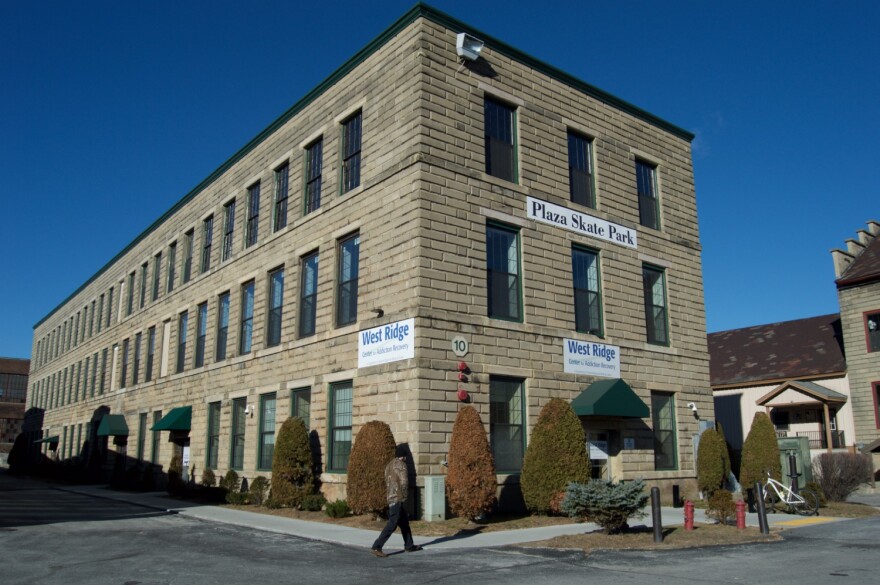By the time Gov. Peter Shumlin shined a spotlight on Vermont’s heroin problem in his 2014 State of the State address, Rutland had been actively battling the issue for more than a year, opening a methadone clinic and launching an innovative multi-pronged, community-based approach called Project Vision.
VPR is reporting on the city’s progress from several perspectives, beginning with two women who’ve battled opiate addiction themselves.
This story is part of State of Recovery, VPR's week-long look at the progress that’s been made in fighting opiate addiction in Vermont and the problems that remain. Read more here.
Sherri Bergeron and Tracie Hauck both paid dearly for their addictions, and both women are now trying to help others get and stay clean at Rutland’s Turning Point Center.
The Turning Point Center, a member of the Vermont Recovery Network, is a nonprofit that provides support services and a substance-free space for those in recovery.
On this particular morning, a boisterous pottery class is going on in one room, down the hall, there’s one-on-one counseling. A Narcotics Anonymous meeting will be held here later tonight.
Sherri Bergeron volunteers here three days a week.

She says her own spiral into addiction started with prescription narcotics and quickly ramped up from there. “I was abusing my pain meds,” she admits. “And then I wanted stronger, better stuff and I went to coke, and I couldn’t find good coke around here to snort, so I went to smoking crack. And then I went to four bags of heroin a day, and that isn’t much to a lot people but it was a lot to me.”
Bergeron, a petite, 43-year-old mother of two, says to maintain her habit, she began dealing. She drove from Rutland to Albany every other day to resupply. “I was selling $4,500 a day. Thursday through Sunday, it was $11,000 to $12,000 [in heroin sales] over a weekend. I was like one of the number one people in Rutland as a seller,” she says.
When asked about her kids, she pauses and tucks her long brown hair behind one ear. “They knew what I was doing,” she says softly. “They were living with me, they knew what I was doing. My mother knew what I was doing. It wasn’t hid. They didn’t like it,” she admits. “But I had to do what I was doing with how bad my addiction was.”
Eventually, Bergeron says, she got arrested. She lost her children and went to jail. Prison turned out to be a blessing, she says, because it led to rehab and forced her to make changes.

She’s now taking methadone and has been heroin free for more than two years.
Her addiction, she says, cost her everything. But she’s slowly rebuilding her life, including her relationship with her two sons. She’s also training to become a recovery coach at the Turning Point Center so she can help others.
Tracie Hauck, the center’s executive director, says people would be shocked to realize how many of their friends, coworkers and neighbors are silently struggling with addiction. She says she did for years.
“First of all my story is just not ...” Hauck pauses trying to think of the right word. “I think it’s common, but nobody hears about these kind of stories. My story is of a registered nurse. I got addicted to opiates.”
Vicodin was Hauck’s drug of choice, a painkiller she says she was introduced to after back surgery. “It made me feel better. It made it easier for me to get up, and go to work, and do my stuff, and play my roles, and not feel miserable,” she says.
Miserable, not so much from physical pain, but from a marriage that she admits was crumbling.

The long time nurse says she began falsifying prescriptions to get the narcotics she needed.
She was caught in May 2013. She lost her nursing license and was charged with a felony. “I mean, if the ground could have opened up and swallowed me at that moment,” she says, and takes a deep breath, “I would have welcomed it.”
Hauck says she gave up narcotics cold turkey the day she was caught, and is now focusing her efforts on helping others beat addiction.
She wipes her eyes and admits despite everything she’s lost, she’s at peace. “I feel like I’ve finally become me today. I just feel like a totally different person. I’m not ashamed of anything I do anymore. I don’t have to hide things. There’s a saying that says you’re only as sick as your secrets. And I don’t have any secrets anymore,” she says with smile that's hopeful and sad at the same time.
She thinks Rutland has taken a similar approach to fighting addiction. The problem will never go away completely, she says. But the fact that the city has launched a community-wide effort to fight back known as Project Vision is encouraging, and she says she regularly attends the monthly meetings.
Hauck admits she lives in a more privileged part of Rutland where people might look down their nose at drug abuse. “But I’m seeing more people from that side of town that are looking at it as these are people, and they need help.” That's a huge and powerful change she says and it gives her hope.





